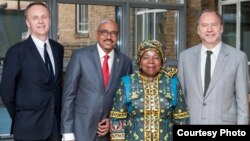A new report warned if treatment and prevention methods for HIV/AIDS are not expanded now, the epidemic could rebound within five years. UNAIDS and the Lancet Commission said while unprecedented progress has been made against the disease, the rate of new infections still is not falling fast enough.
UNAIDS Executive Director Michel Sidibé described the next five years as a “fragile window of opportunity to fast-track the response and end the AIDS epidemic by 2030.” He warned if no action is taken, the “human and financial consequences will be catastrophic.”
Tim Martineau, UNAIDS Chief of Staff, said, “It’s a very serious message. We actually think it’s quite a positive message. We think that there has been enormous progress in the AIDS response. What we’re saying is that this next five year window is incredibly important if we want to see the end of AIDS by 2030 as a public health problem.”
Martineau said current efforts simply won’t be enough to meet demand.
“Current efforts basically are doing an enormous amount of good. But what we will see over the next few years is a bulge in young people within the population, particularly. That will have a significant impact on the nature of the epidemic. And if you combine this with a growing number of people living with HIV – a growing number of people who still do not know their status – then there is a risk that we will not get in front of the epidemic.”
Populations at high risk for HIV infection vary by region.
He said, “If you’re in southern Africa and you’re a young woman, you’re at greatest risk. If you’re men who have sex with men and you’re in Europe, then you’re probably at significant risk. [In] Eastern Europe and in Russia, then we would look particularly at drugs users. There is quite [a] regional variation within the epidemic.”
Countries, Martineau said, will have to tailor their response to the epidemic as a result.
UNAIDS hopes to announce this year that 15 million people are receiving anti-retroviral drugs – a goal set by the international community. However, Martineau says there may be millions more who need the drugs, but are not aware of their HIV status.
“We’ve anticipated that we do need to increase the amount of money provided for the response. We obviously are looking to see the international communities provide resources, as they have done so far and it continues to stay stable. We’re encouraged to see countries are increasing their own financing for the response and it will need to increase over time. But we also anticipate with better strategic information, better innovations in the way that services are provided, we should be able to see better efficiency so that we’re getting the best from the resources currently being provided,” he said.
The UNAIDS / Lancet Commission report warned against complacency.
“There is a strong international response to the epidemic still. But there is a concern that as we achieve great results that that will mean that people believe that the epidemic is over. And what we’re trying to say is it’s not over. Use the next five years to make sure that we do see an end in sight. Otherwise, things will continue to deteriorate,” said Martineau.
He said expanding efforts against HIV should include more funding, greater access to treatment for drug users, wider availability of condoms, an increase in male circumcision, greater use of antiretrovirals as a prevention method and legal efforts to ban discrimination against the LGBT community.
Martineau added that to end the HIV/AIDS epidemic there must be a close relationship among political leaders, scientists, activists and NGOs. It’s a model he said that can be used to solve other health problems, as well.





